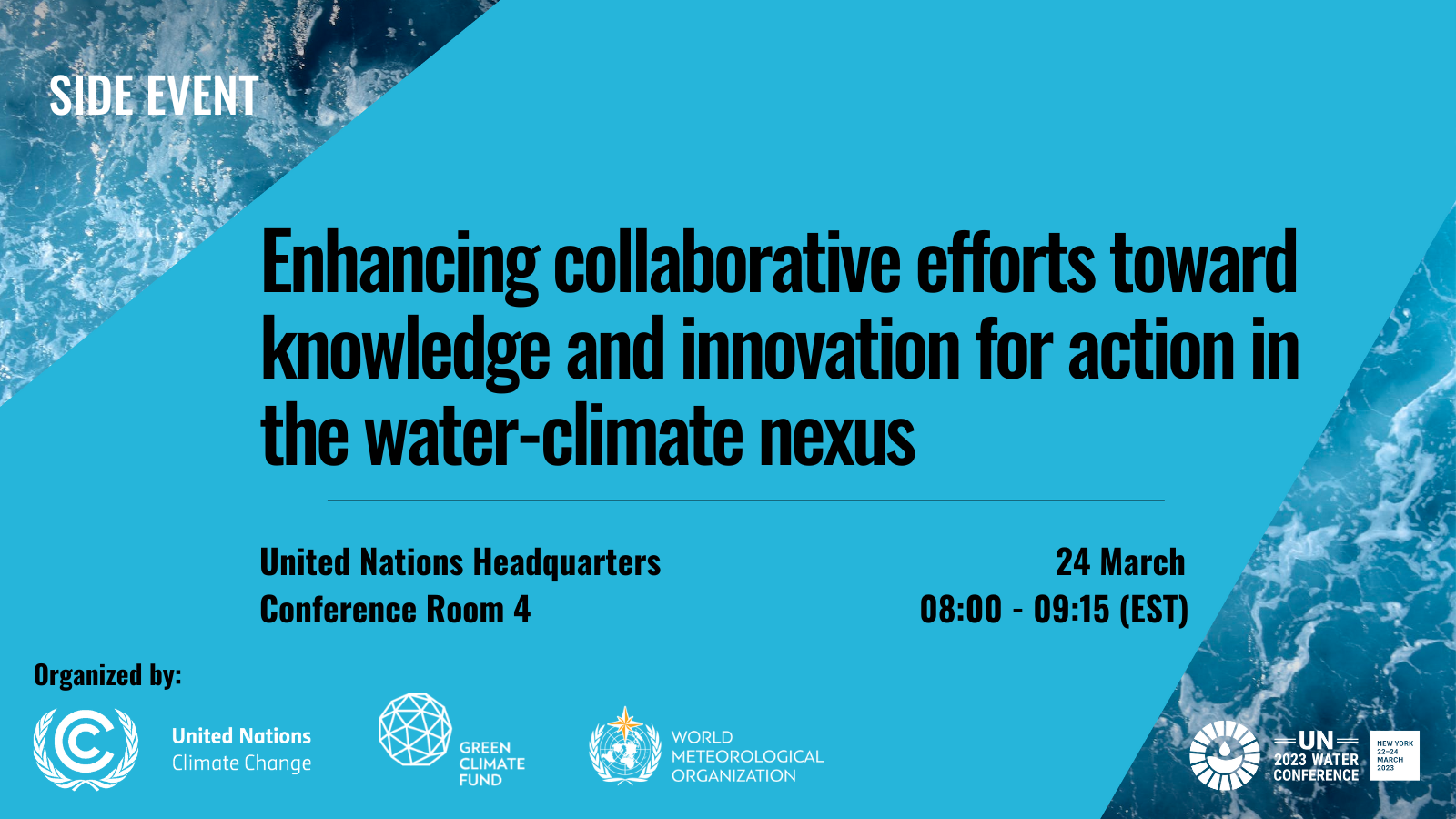Information on how to join:
Duly registered conference participants will be able to join the event in person. Virtual participants can use the following link via UN Web TV: https://media.un.org/en/asset/k1t/k1tt7nm65c
This event will lay the foundation for an envisioned long-term engagement between the UNFCCC, GCF, WMO, and potentially the wider UN-Water community as well as other relevant communities of practice that can facilitate transformative action to address water-climate challenges in developing countries.
The UNFCCC secretariat has established an action pledge under its Knowledge-to-Action Hub for adaptation and resilience – the Nairobi Work Programme that will facilitate synergistic collaboration with the UN system and with relevant communities of practice outside the UN.
Hinged on 3 major pillars – Knowledge, Innovation, and Action (KIA), the action pledge is aimed at
- Catalyzing and strengthening communities of practice to address knowledge gaps,
- Unlocking innovation and
- Scaling up action to address the nexus of water–climate challenges in developing countries.
This action pledge will form part of the water action agenda and will leverage the comparative advantages of organizations such as the WMO and GCF, among others for its operationalization.
The objectives of the event are to:
- Elaborate on the action pledge and highlight various areas for synergistic collaboration with relevant communities of practice
- Highlight the mandates and potential role of the UNFCCC, GCF, and WMO in realizing the ambitions of this action pledge
- Understand the role of other stakeholders – including other UN agencies and networks such as UN-Water, UNEP, UNDRR, and UNCCD with their various global agendas and mandates, and non-UN agencies involved in addressing water-climate challenges, especially in developing countries.
- Gain insights to inform the operational framework of the action pledge
Background
Water and climate change are inextricably linked. The recently released IPCC AR6 WGII report highlights the climate change threats related to water especially, climate extremes impacting water availability and its predictability, quality, and related sustainable development benefits.
As such, utilizing a climate-resilience lens in understanding and subsequently addressing water management is critical. Moreover, a whole system approach that cuts across disciplines is urgently needed to address these water-climate-related risks in an integrated manner, including learning from the practices of local communities and indigenous peoples. Even though significant advances in the technology of observation and data management have created enormous opportunities in terms of complex modeling for water-related risk assessment, challenges of transforming these solutions to the operational level prevail. Data and research advancements are often not incorporated into the operational services domain. Moreover, there are several technical, political, regulatory, institutional, market, macroeconomic, and infrastructure barriers to investment in new climate solutions, particularly in developing countries. In addition, there is an increased risk perception surrounding climate investments in developing countries.
Recently, at its 27th session (COP 27), the Conference of the Parties to the United Nations Convention on Climate Change (UNFCCC) re-emphasized water’s critical role in climate change adaptation and related co-benefits including protecting, conserving, and restoring water systems and water-related ecosystems, while ensuring social and environmental safeguards. The COP further emphasized and urged Parties to integrate the protection and restoration of water and water-related ecosystems into their adaptation efforts. Additionally, with the support of the World Meteorological Organisation (WMO), the Early Warning for All Action Plan was unveiled at COP 27 with an ambition to increase early warning services globally and better respond to disasters, including water-related disasters. Likewise, the Green Climate Fund (GCF) recently released the GCF Water Project Design Guidelines building on its Water Security Sectoral Guide. These guidelines provide practical information and recommendations; insights into the preparation of integrated water resources management projects that include actual investments and are focused on climate change adaptation; climate resilient WASH projects; and drought and flood risk management projects to enable countries to acquire funding.
Agenda
| Time |
Agenda |
Potential speaker(s)
|
|
08:00 – 08:15
|
High-level opening segment |
| 7 mins |
Welcome Remarks
Communicating the Action pledge under Nairobi Work Programme
|
Simon Stiell, Executive Secretary, UNFCCC secretariat
|
|
8 mins
|
High-Level Keynotes
Highlighting how UN/non-UN organizations are uniquely placed to contribute to addressing water-climate challenges
|
Oyun Sanjaasuren - Director GCF
Juerg Luterbacher, Director, WMO
|
|
08:15 – 08:40
|
Technical segment |
|
5 mins
|
Setting the scene:
Introduction to technical segment: objectives and expectations
|
Moderator
Danielle Gaillard
|
|
20 mins
|
Knowledge, Innovation, Action
- What are the persistent needs and gaps in knowledge, innovation, and scaling up action to address water-climate challenges?
- How do we utilize diverse knowledge systems, including that of local communities and indigenous peoples, to catalyze innovation and eventually scale up action?
- The action pledge in force: what would success for it look like?
|
Laurent-Charles Tremblay-Lévesque, Global Water Partnership
James Rattling Leaf, Global Indigenous Consultant
Pamela Mbabazi, Executive Chairperson, National Planning Authority, Uganda
Koen Verbist, Programme Specialist, UNESCO
|
|
08:40 – 09:00
|
Enhancing Collaboration |
| 20 mins |
Finding inter-agency collaboration entry points
- What channels can be leveraged to realize the ambition of this action pledge?
|
Stefan Uhlenbrook (TBC), Director of Hydrology, Water and Cryosphere, WMO
Bapon Fakhruddin, Water Sector Lead, GCF
Fan Zhang, Lead Economist, Global Lead for Water Economy and Climate Change, World Bank
|
|
09:00 – 09:10
|
Moderated discussion and Q&A |
Moderator and audience |
|
09:10 – 09:15
|
Closing remarks/Wrap up |
Moderator |
